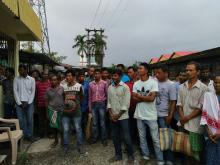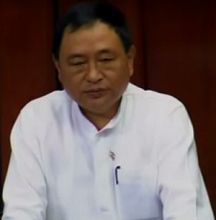NOT A LADY?
Sarojini Naidu had not reached the Congress pavilion at Gauhati (now Guwahati) in time to support Mahatma Gandhi’s Condolence Resolution. Mahommed Ali was in the oratorical climax of his speech when Bapu asked the Assam Congress President, Maulana M. Tayyebulla to send for Sarojini Naidu at once.
Forgetful Naidu came running breathlessly. She was rushing through a Men’s Gate when two volunteers – poor, simple, fresh from their village homes – came up and tried to obstruct her. Saying, ‘Yeh Lady Gate nahi nahi’ in their newly-schooled broken Hindi, the volunteers showed her the distant Ladies’ Gate. The blithe Bulbul of Hindustan simply pecked at the two rustics on-duty and brushing them aside made her way. She was heard ejaculating: ‘Silly owls, I am NOT a lady’.
HOLY SECRET
An orthodox type of conservative Brahmin, a Gossain though of miserly habits had just returned from a religious pilgrimage and was relating the common legend about the ‘Akshay Bakul’, the eternal Bakul tree of Vrindaban to a friend with a show of reverence and devotion. He narrated how Lord Shri Krishna had rubbed butter (noni) on the trunk of the Bakul tree and how the whitish dried-up butter was still intact by the grace of the Lord round the big hollow of the Bakul etc.
One day while inspecting the felling of trees T.R. Phookan suddenly came across an identical Bakul with the same hollow smeared white with noni (butter). At once he conspired to tell the devotee Gossain all about the discovery and to show it to him.
When Gossain saw the Bakul, he was awe-struck and dismayed for he had throughout his life believed that the Vrindaban Bakul was by the Lord’s blessings the only Lord’s Bakul in the universe. Gossain muttered ‘Ram, Ram’ in bewilderment and entreated Phookan, the brother Brahmin not to divulge this to anyone but keep it between them a holy secret.
NO GRASS EATING
In conventional Congress style arrangements for vegetarian food were made. At the very first meal Pandit Jawaharlal Nehru and Vithallbhai Patel (Dr. Ansari who was sick was on barley diet) were looking at each other’s face sheepishly and were apparently feeling somewhat uneasy over the menu. They called Maulana Tayyebulla and in some confidence asked in whispering tone: ‘Are the people here too C.R. and Iyyenger – all grass-eaters?’
Non-vegetarian menu was announced for the next meal. Nehru shrugging his shoulders in his own characteristic manner laughed heartily – Vithallbhai gravely joining when the host, T.R. Phookan in great fun declared: ‘No more grass eating’. All the three master wits made the non-vegetarian table roar with laughter – Vithallbhai with an austere face intervening to say: ‘No more grazing here then!’
NEHRU AND THE OCTOPUS
After many a wayside meeting, Nehru arrived at a tea-garden center near the town of Golaghat in Upper Assam where a mammoth meeting was arranged for him. The touching of his feet by people here and there and everywhere n the way was all the time worrying him to the point of irritation. At the close of his speech before resuming his seat on the rostrum, Nehru made an appeal to the people (fretting querulously): ‘Main koi sadhu, koi dharam guru, avatar nahi hoon; payer pakrne se mujhe raj hota hai’ (I am no saint, no priest, no incarnation: feet-touching distresses me.)
A septuagenarian village elder, a simple Barsaikia who did not know what was said instantly came up and fell flat before the idol and reverentially louched his feet and felt hiself glorified. The frowning idol fitfully flared up: ‘Yeh kia wahiat?’ (What’s all this nonsense?)
What does the devotee Barsaikia understand of Nehru’s urdu ‘wahiat’? He clasped both the legs of his god. The furious flesh-and-blood deity freed himself from the octopus and, jumping down from the high rostrum to the ground, made his way hurriedly to the waiting car – fretting, fuming and murmuring.
Awe-struck Barsaikia was up on his feet on the dias while his modern Krishna-Kanu climbed the Kadamba tree – in modern civilized parlance, the limousine. The devotee was seen casting a lingering look at his Bhooban-Mohan.
THE TWIN GHOST
A veteran of the 1905 Anarchist Movement and a national poet of great repute, Ambikagiri Roy Chaudhury came to Delhi represent the Asom Jatiya Mahasabha’s views. He presented his one-sheet memorandum to the Sardar. As Vallabhbhai was glancing through it, he was told about Roy Chaudhury’s decision to fast unto death with the whole family if Assam was c ompelled to go to the ‘Pakistan group’.
Vallabhbhai, a master wit who remains grave when he makes all break their ribs, intervened: ‘Tayyebulla Sahib, Bapu se mat kaho: woh inko rok lenge’ (Tayyebulla Sahib, don’t tell Bapu: he will stop him). Turning to Ambikagiri, he continued: ‘Fast karo, zaroor karo: aisey jagah chale jaoge ki pata nahin chalega wahan Assam main grouping hua ya nahin hua’ (Fast, fast to be sure and you will go to such a place where you will not know whether Assam has gone to the grouping or not).
The twin ghosts of ‘grouping’ and Pakistan were no more there to beckon and lure Bapu’s ‘Lovely Assam’. At last the tragedy ended in comedy. All is well that ends well.
By Omar Luther King
(The author is the son of freedom fighter Maulana M. Tayyebulla of Assam.)







Comments
Pages
Add new comment